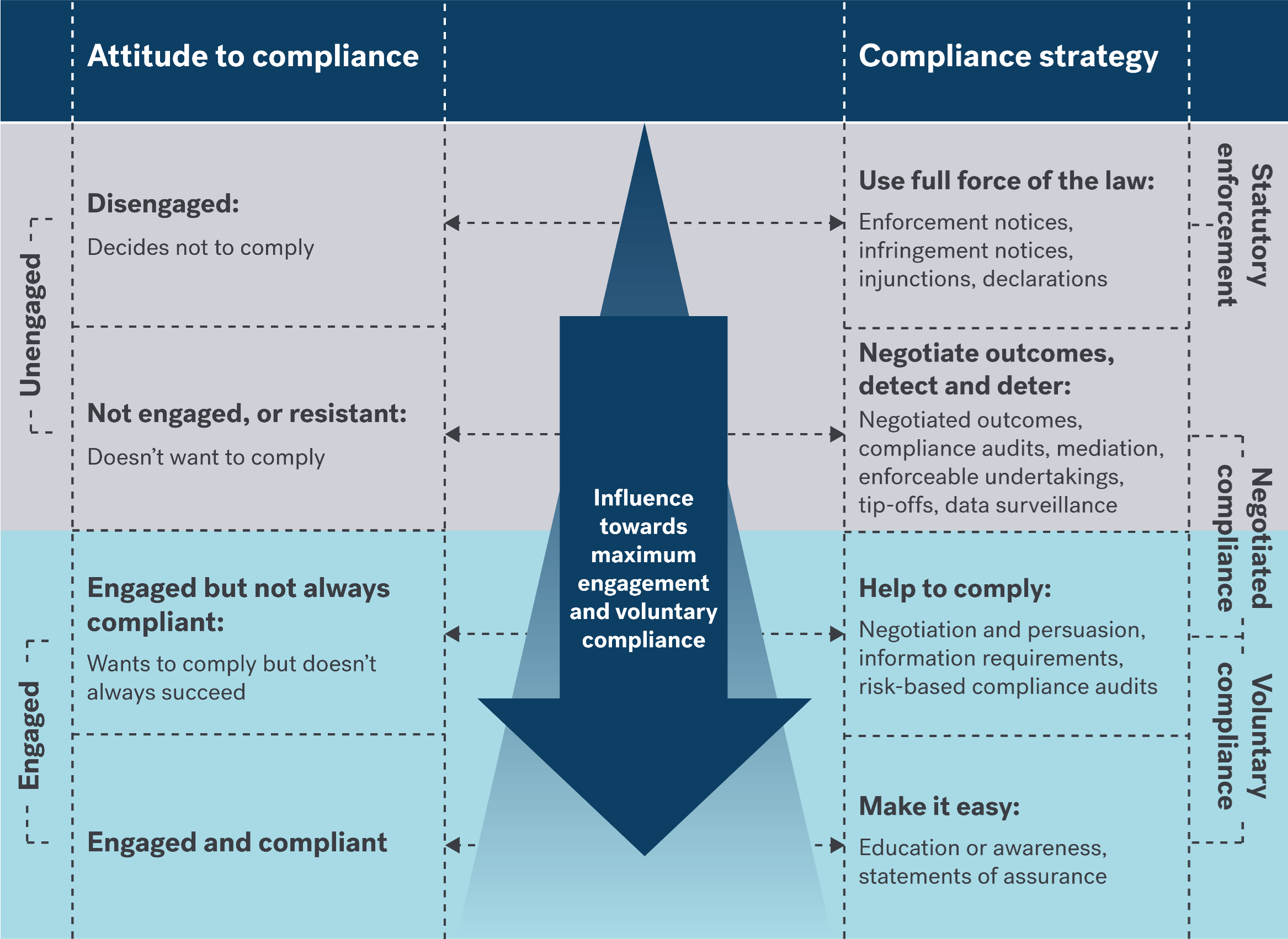Purpose
This framework is designed to guide the VRQA Schools Unit in the assessment of risks and determination of regulatory actions after a school review. This framework will ensure that our regulatory decisions taken after school reviews are fair, consistent, proportionate and transparent. The framework applies to all VRQA initiated school reviews including those in the government and Catholic school sectors.
Our values are applied at all stages of a school review process and this framework aligns with our Provider risk framework.
Background
The Education and Training Reform Act 2006 (the Act) prescribes what action the VRQA may take after conducting a school review and determining that the school no longer complies with the prescribed minimum standards for registration.
If the VRQA determines that the school no longer complies with one or more of the prescribed minimum standards for registration, it may take any one or more of the following actions:
- Suspend or cancel the registration of the school.
- Prohibit the school from enrolling any new students.
- Require the school to report to the parents of students at the school that the school does not comply with the prescribed minimum standards for registration.
- Impose conditions on the school’s registration.
If the school has partially complied with the requirements of the original action, the VRQA may substitute an action (other than the cancellation of registration) with another action that is sufficient to ensure that the school will comply with the prescribed minimum standards.
The VRQA has the power to enter into an enforceable undertaking with a school if the school:
- is prepared to acknowledge the areas of non-compliance
- is prepared to take immediate steps toward achieving compliance
- understands that a breach of the enforceable undertaking may result in the VRQA seeking an order for enforcement from the Magistrates’ Court.
Context
The Act and the Education and Training Reform Regulations 2017 do not rank any one of the prescribed minimum standards more highly than another. However, the VRQA Guidelines to the Minimum Standards and Requirements for School Registration (the Guidelines) state that the minimum standards provide a foundation for quality schools through:
- good governance
- strong financial management
- effective curriculum
- sound teaching practices; and
- safe environments for children.
The criteria used by the VRQA in making an assessment as to compliance are set out in the evidence requirements in the Guidelines, which are attached at the end of this framework.
The principles underlying the Act also provide that all Victorians, irrespective of the education and training institution they attend, where they live, or their social or economic status should have access to a high quality education.
In this context, the VRQA has developed a provider risk framework for schools which focuses on:
- The protection of students as consumers of education, including a student’s rights to be safe and to have a high quality education.
- The effective governance of the school which must ensure that it is financially viable.
- The history of non-compliance, including substantiated complaints.
References
- Education and Training Reform Act 2006
- Education and Training Reform Regulations 2017
- VRQA Guidelines to the Minimum Standards and Requirements for School Registration
- VRQA Enforceable Undertaking Policy August 2015
- VRQA Complaints Policy and Procedure
- Annual Review of VRQA Legislation and Delegate Actions April 2019
- VRQA Provider Risk Framework
- VRQA Compliance Framework
- The VRQA’s values
- Victorian Model Litigant Guidelines
Compliance Framework
The VRQA framework puts the risk of harm at the centre of its model of compliance.
How the framework is applied in school review
The VRQA takes the following steps:
- Schools are identified for either specific or general review.
- A specific review will focus on the urgent grounds that have been identified, for example through a media report, complaint or referral from another agency. These matters generally relate to high-risk areas such as allegations of risk to either student safety, the effective governance of the school or the financial viability of the school.
- General reviews take place on a five year cycle, although a review may be conducted at any time. The scope of a general review will be determined after an assessment of the risk of the school’s non-compliance with the minimum standards for registration.
- The VRQA may use a contracted reviewer to undertake a school review. Generally contractors are engaged to undertake reviews of schools who are assessed as being at high risk of non-compliance with the minimum standards for registration. Contractors will provide the school with a copy of their draft review report for correction of fact before it is submitted to the VRQA for assessment.
- The VRQA school reviewer will make a recommendation to the Manager of the Schools Unit regarding the level of non-compliance identified in the report. The Manager determines the level of risk in consultation with other VRQA officers who may include the Principal Lawyer, Chief Financial Officer and Child Safe Investigation Officer.
- The Manager will present the risk assessment at regular school review meetings to moderate and re-assess risk and consider options for after-review actions to best ensure the school achieves compliance.
- After this meeting, representatives of schools assessed as high-risk will be invited to meet with the Chief Executive Officer (Director) or another delegate to determine the school’s response to addressing identified non-compliances.
Levels of risk
High-risk – the school refuses to accept non-compliances and has a history of non-compliance. The school’s non-compliances include governance and child safety. After a meeting with the CEO (Director) or other delegate, the review will be closed and show cause for cancelation will be issued, triggering further procedures detailed in the Act.
Medium-risk – the school initially refuses to accept non-compliances and/or urgency of action required. At a meeting with the CEO (Director) or other delegate, the school governing body understands and agrees to address non-compliances. The VRQA will agree to accept an enforceable undertaking that includes acceptable timelines for rectification and how verification will occur. Schools providing enforceable undertakings must demonstrate that they have taken their own legal and financial advice before it can be accepted. The review is closed once the VRQA is given the ability to enforce the undertaking through the Magistrates’ Court.
Low-risk – the school accepts non-compliances and requires further guidance and direction from the VRQA to ensure that rectification is completed within an acceptable period of time. Negotiated outcomes confirmed after a meeting with the VRQA Manager, Schools and Principal Lawyer. The review is not closed, and will be kept open until all rectifications are completed. Depending on the non-compliances, the VRQA may require an authorised officer to attend the school to validate compliance, after which review is closed.
Decisions after a school review
- Decisions to close a school review must be made by the CEO (Director) or other delegate.
- Decisions taken that exercise regulatory powers must be actioned consistent with the Annual Review of VRQA Legislation and Delegate Actions. This report mandates what actions may be taken under delegation and what matters are reserved for the determination of the VRQA Board.
- Decisions taken by a delegate must be reported to the next VRQA Board meeting in the Delegations Report.
If a decision is taken to initiate ‘show cause’ action, the delegate must ensure that the school is:
- provided with sufficient information to understand the reasons for the action
- advised of their right to appeal the proposed action to the CEO (Director) and/or the Minister for Education, and ultimately seek review of the decision at the Victorian Civil and Administrative Appeals Tribunal.
If a school is dissatisfied with the handling of the review they may also lodge a complaint with the VRQA’s Complaints Unit and/or with the Victorian Ombudsman.
- The VRQA Principal Lawyer will manage any litigation which flows from a decision. The VRQA will at all times follow the Victorian Government’s Model Litigant Guidelines.
Download:
Updated


